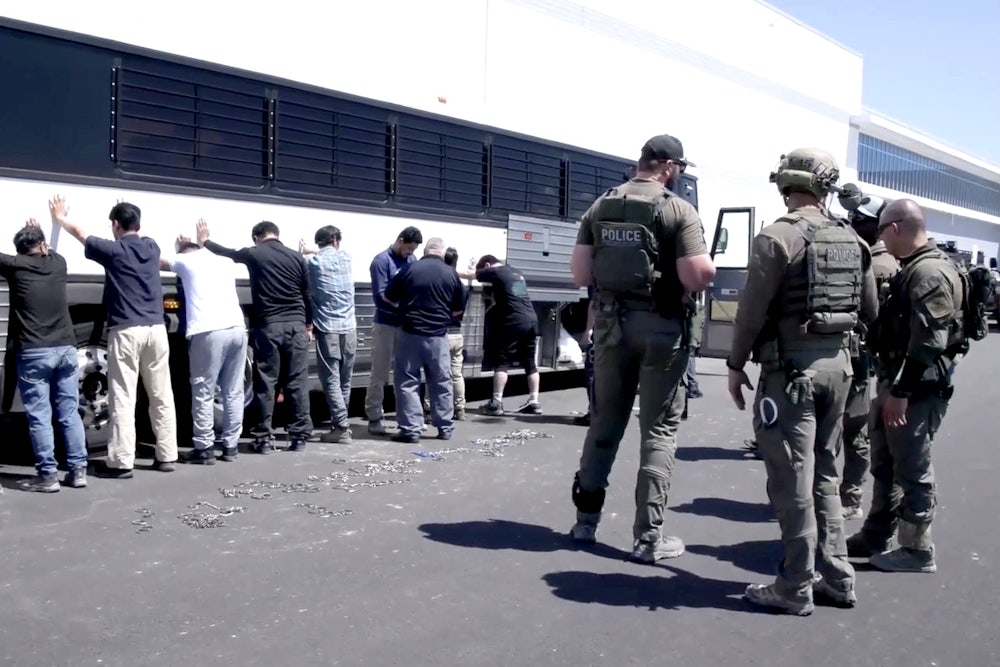The Trump administration would like you to believe that when it detained 475 people at an electric vehicle battery production facility in Georgia last Thursday, it did so in the name of protecting workers. Immigration and Customs Enforcement claimed that the raid was the result of an “ongoing criminal investigation” into “unlawful employment practices and other potential federal crimes” at a plant jointly operated by the Korean firms Hyundai Motor Group and LG Energy Solution. “This operation underscores our commitment to protecting jobs for Georgians, ensuring a level playing field for businesses that comply with the law, safeguarding the integrity of our economy, and protecting workers from exploitation,” a spokesperson for ICE told NBC News.
As of Monday, no criminal charges had been issued. It’s still unclear how many of the predominately Korean and Latino workers swept up in the military-style operation violated the law. South Korea’s government—fresh off seemingly productive trade negotiations with the Trump administration—has reportedly brokered a deal securing the release of 300 of its citizens from U.S. custody and their return to South Korea via charter flight. Among those detained were also some number of U.S. citizens and lawful permanent residents who Steven Schrank, a special agent in charge of Homeland Security Investigations for Georgia, said would be released. To state the obvious, an administration trying to strip half a million federal employees of their union rights and kneecap the National Labor Relations Board is less interested in protecting manufacturing workers from “exploitation” than in deflecting attention away from its own increasingly obvious failure to Make Manufacturing Great Again.
Evidence of this failure is all over the place, including in the jobs numbers. The same day as the raid in Georgia, the Bureau of Labor Statistics announced that employment in the U.S. manufacturing sector—which Trump pledged to revive through tariffs—has instead fallen for four months straight, having dropped by 12,000 jobs in August alone. Since last August, domestic manufacturers have hemorrhaged a total of 78,000 jobs. To distract from the losses, it seems, the administration is falling back on its favorite scapegoats: foreigners and green energy technologies.
Whether in Los Angeles, Boston, or the Savannah suburbs, the White House’s attempts to terrorize migrant communities are part and parcel of a plan to revive manufacturing that’s as cruel as it is stupid. Factories need to be built, and nine out of 10 construction firms now report openings for construction craft workers such as masons and equipment operators. Like many other parts of the economy, the building sector relies heavily on foreign-born workers. Republicans would like to deport as many of them as possible, supposedly to allow U.S.-born workers to take those jobs. ICE contends that “many” of the people detained on Friday were “fraudulently using visitor visas.” The exact nature of the detainees’ work remains unknown. The battery plant that was raided was still under construction, and due to begin production in late 2025 or early 2026.
If the White House were genuinely interested in protecting Hyundai-LG workers from exploitation, it would go after bosses who take advantage of flawed visa programs to boost profit margins. Per the Financial Times, visa abuse is an “open secret” among many Korean manufacturers operating in the United States, which invested $22 billion here last year. Unlike other countries with which the U.S. has a free trade agreement, such as Singapore, South Korea does not have a country-specific scheme allowing workers there to receive temporary working visas. Accordingly, firms and their subcontractors often bring in employees using B-1 visas, which allow entry to the U.S. for certain business purposes but not for waged labor like construction. Employer abuse of the visa system isn’t unique to Korean firms, nor to battery and auto manufacturing. The White House hasn’t shown any interest in confronting those challenges or disciplining corporations, opting instead to torment migrants with militarized raids, occupations, and abductions.
Korean workers, meanwhile, are vital to the high-tech manufacturing investment the Trump administration has been eager to court from the longtime U.S. ally. The two countries recently made progress toward a $350 billion agreement that would involve Korean companies investing in the U.S. in exchange for more favorable, 15 percent tariffs; after last week’s raid and the ensuing outrage over it across the political spectrum in South Korea, the deal is now deadlocked. Core to prospective investments will be projects like the Hyundai-LG battery plant, which rely heavily on Korean engineers to supervise factory construction and train U.S. workers to operate and service the machines that help produce the lithium-ion batteries used in electric vehicles and for energy storage. A relatively novel industrial process for the U.S., this type of lithium-ion battery production is highly mechanized work, involving volatile substances that can be dangerous or even deadly when handled improperly. Workers in other joint ventures between U.S. car manufacturers and Korean battery makers, including LG, have fought for union representation from the United Auto Workers to secure protections against those sorts of dangers. They’ve raised concerns, as well, about companies providing inadequate translation services between staff from both countries. Just a few weeks ago, a majority of workers at Blue Oval SK—a joint venture between Ford and SK On—voted in favor of joining the UAW.
In a press statement, the UAW condemned both the raid and Hyundai’s “disgraceful record on worker safety,” adding that the union stands “with all workers—immigrant and native-born alike—against unsafe corporations and militarized attacks on our workplaces.” Referencing Trump’s musing that “if we don’t have the manpower in the United States, bring in Korean workers and train them,” the Korean Federation of Trade Unions wrote in its response to the raid that Trump “treats Korean workers not as equal partners, but as cheap tools to be called in when needed.” The union further demanded the immediate release of all detained Korean workers, and for Korean companies to “face the reality of the U.S. government’s labor oppression and cease indiscriminate investment in the United States. Investments that do not guarantee workers’ rights and safety cannot be justified.”
The fact that Korean investment in the U.S. relies on Korean workers coming here has been a bit awkward for White House, to say the least. “Your Investments are welcome, and we encourage you to LEGALLY bring your very smart people, with great technical talent, to build World Class products, and we will make it quickly and legally possible for you to do so,” Trump wrote on Truth Social. Nothing could be further from what his administration is actually doing, however. Aside from criminalizing migrants, Republicans following Trump’s orders are hacking away at the incentives that spurred on those sorts of investments, including Hyundai’s own $26 billion worth of E.V. investments across the U.S. Thanks to Republicans’ One Big Beautiful Bill, $7,500 consumer-side tax credits for E.V.s will phase out after September, followed by a slew of other subsidies for purchasing and manufacturing low-carbon technologies that were put in place by the Inflation Reduction Act.
For as long as there have been factories in the United States, the right has pitted workers from different countries and backgrounds against one another in order to keep them from joining forces. What’s new is the attempt to turn them against low-carbon technologies. On the campaign trail, Vice President JD Vance warned that Kamala Harris’s alleged “obsession with electric vehicles and forcing Americans to buy Chinese-made electric vehicles” would “destroy the Michigan auto industry,” and derided Biden-era tax incentives as a way for “rich people” to purchase “luxury” E.V.s. Along similar lines, Republican Senator Josh Hawley crowed that autoworkers “deserve to have their jobs protected from Joe Biden’s stupid climate mandates that are destroying the U.S. auto industry and making China rich.”
It’s possible that it’s just a coincidence that the Department of Homeland Security chose to carry out what it boasts is its largest-ever raid on a single facility on a foreign-owned factory making electric batteries. It’s perhaps even more possible, though, that the White House saw an opportunity to, in one fell swoop, terrorize migrants, undermine E.V.s, and blame them both for its own failures in the manufacturing sector. Trump can’t seem to make factories hum, but he can always find a scapegoat.






